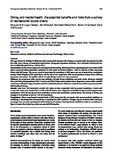Diving and mental health: the potential benefits and risks from a survey of recreational scuba divers
| dc.contributor.author | St Leger Dowse, M | |
| dc.contributor.author | Whalley, Ben | |
| dc.contributor.author | Waterman, MK | |
| dc.contributor.author | Conway, RM | |
| dc.contributor.author | Smeardon, GR | |
| dc.date.accessioned | 2020-07-09T07:51:08Z | |
| dc.date.issued | 2019-12-20 | |
| dc.identifier.issn | 1833-3516 | |
| dc.identifier.issn | 2209-1491 | |
| dc.identifier.other | PMID 31828748 | |
| dc.identifier.uri | http://hdl.handle.net/10026.1/15877 | |
| dc.description | 12 months embargo | |
| dc.description.abstract |
INTRODUCTION: Scuba diving is physically and cognitively demanding. Medical guidance regarding physical and mental health (MH) issues and related prescribed medication is often based on limited evidence. There is a paucity of data concerning diving with MH issues. This survey aimed to investigate the prevalence of MH issues and use of prescription medications among United Kingdom (UK) sport divers, and the rate of non-compliance with current guidance among divers suffering depression and anxiety. The positive effects of scuba diving on MH were also considered. METHODS: An anonymous online survey was publicised through diving exhibitions and social media. Measures included diver and diving demographics; GAD-7 Anxiety and PHQ-9 depression questionnaires; diagnosed current and/or past MH conditions; medication usage; comorbid medical conditions/treatments; disclosure of past/current MH issues; and perceived MH benefits of diving. RESULTS: Data from 729 respondents revealed MH issues at rates comparable with the general population. Current and/or past MH issues were reported by 111/729, with 60 having active diagnoses, and 45/60 taking prescribed psychotropic medications; 21/45 did not declare their medication on diver self-certification medical forms. The activity of diving was thought to be beneficial to MH by 119/729 respondents. CONCLUSIONS: Divers experienced expected levels of MH issues, but did not comply with current medical guidelines on modifying or abstaining from diving activity or reporting their MH condition. Changes may be needed to diver training to encourage more accurate reporting and aid development of evidence-based protocols. Guidelines could be reconsidered in light of current diver behaviour, risks and potential MH benefits. | |
| dc.format.extent | 291-297 | |
| dc.format.medium | ||
| dc.language | eng | |
| dc.language.iso | en | |
| dc.publisher | Diving and Hyperbaric Medicine Journal | |
| dc.rights | Attribution-ShareAlike 4.0 International | |
| dc.rights | Attribution-ShareAlike 4.0 International | |
| dc.rights | Attribution-ShareAlike 4.0 International | |
| dc.rights | Attribution-ShareAlike 4.0 International | |
| dc.rights | Attribution-ShareAlike 4.0 International | |
| dc.rights.uri | http://creativecommons.org/licenses/by-sa/4.0/ | |
| dc.rights.uri | http://creativecommons.org/licenses/by-sa/4.0/ | |
| dc.rights.uri | http://creativecommons.org/licenses/by-sa/4.0/ | |
| dc.rights.uri | http://creativecommons.org/licenses/by-sa/4.0/ | |
| dc.rights.uri | http://creativecommons.org/licenses/by-sa/4.0/ | |
| dc.subject | Depression | |
| dc.subject | Anxiety | |
| dc.subject | Medical conditions and problems | |
| dc.subject | Psychology | |
| dc.subject | Fitness to dive | |
| dc.title | Diving and mental health: the potential benefits and risks from a survey of recreational scuba divers | |
| dc.type | journal-article | |
| dc.type | Journal Article | |
| plymouth.author-url | https://www.webofscience.com/api/gateway?GWVersion=2&SrcApp=PARTNER_APP&SrcAuth=LinksAMR&KeyUT=WOS:000506856100008&DestLinkType=FullRecord&DestApp=ALL_WOS&UsrCustomerID=11bb513d99f797142bcfeffcc58ea008 | |
| plymouth.issue | 4 | |
| plymouth.volume | 49 | |
| plymouth.publication-status | Published online | |
| plymouth.journal | Diving and Hyperbaric Medicine Journal | |
| dc.identifier.doi | 10.28920/dhm49.4.291-297 | |
| plymouth.organisational-group | /Plymouth | |
| plymouth.organisational-group | /Plymouth/Faculty of Health | |
| plymouth.organisational-group | /Plymouth/Faculty of Health/School of Psychology | |
| plymouth.organisational-group | /Plymouth/REF 2021 Researchers by UoA | |
| plymouth.organisational-group | /Plymouth/REF 2021 Researchers by UoA/UoA04 Psychology, Psychiatry and Neuroscience | |
| plymouth.organisational-group | /Plymouth/Research Groups | |
| plymouth.organisational-group | /Plymouth/Research Groups/Centre for Brain, Cognition and Behaviour (CBCB) | |
| plymouth.organisational-group | /Plymouth/Research Groups/Centre for Brain, Cognition and Behaviour (CBCB)/Behaviour | |
| plymouth.organisational-group | /Plymouth/Research Groups/Plymouth Institute of Health and Care Research (PIHR) | |
| plymouth.organisational-group | /Plymouth/Users by role | |
| plymouth.organisational-group | /Plymouth/Users by role/Academics | |
| dc.publisher.place | Australia | |
| dcterms.dateAccepted | 2019-08-31 | |
| dc.rights.embargodate | 2020-12-20 | |
| dc.identifier.eissn | 2209-1491 | |
| dc.rights.embargoperiod | Not known | |
| rioxxterms.versionofrecord | 10.28920/dhm49.4.291-297 | |
| rioxxterms.licenseref.uri | http://creativecommons.org/licenses/by-sa/4.0/ | |
| rioxxterms.licenseref.startdate | 2019-12-20 | |
| rioxxterms.type | Journal Article/Review |



